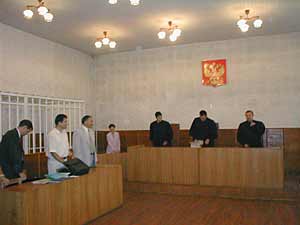
The system built to manage Russia’s nuclear legacy is crumbling, our new report shows
Our op-ed originally appeared in The Moscow Times. For more than three decades, Russia has been burdened with the remains of the Soviet ...
News

Publish date: September 6, 2001
Written by: Jon Gauslaa
News
Throughout the current week the Pacific Fleet Court has not only been occupied with witness interrogations and expert evaluations. It has also evaluated various documents, which has been sent to the Court on its request, but not all the requested documents were available.
– FSB hides the traces of their crime
Some of the documents the Court has asked for have disappeared, Ivan Pavlov said after yesterdays court session. Although the documents according to the regulations shall be kept for at least five years, they have apparently been destroyed. The FSB hides the traces of their crime against Grigory, the attorney said.
Some important documents were however, still available. They show that Grigory addressed the chiefs of the Pacific Fleet urging them to pay more attention to the problems related to nuclear waste decommissioning and asking for permission to visit the navy bases in order to write an article on the subject, Pavlov said. While one admiral thought that no articles were needed, another issued permission because decommissioning is needed at the fleet.
Later the FSB charged Pasko with having drafted an article on the subject, in which he allegedly had included some state secrets. The draft was confiscated at the illegal search of Paskos flat in November 1997, and the local chekists then made up charges against Pasko, claiming that he had kept this article at his flat for a subsequent transfer to Japan.
We managed to prove that Pasko was acting in accordance with the regulations, said Pavlov. Grigory worked openly. His articles touched upon actual and acute problems of the fleet. Would he have made several calls asking for permission to write an article on decommissioning of nuclear waste if he really was engaged in espionage and wanted to disclose secret information, asked Pavlov rhetorically.
While it until recently was reason to believe that the trial would be over in early October, the latest buzz around town here in Vladivostok is that the trial may continue well into November, and maybe even longer.

Our op-ed originally appeared in The Moscow Times. For more than three decades, Russia has been burdened with the remains of the Soviet ...

The United Nation’s COP30 global climate negotiations in Belém, Brazil ended this weekend with a watered-down resolution that failed to halt deforest...

For more than a week now — beginning September 23 — the Zaporizhzhia Nuclear Power Plant (ZNPP) has remained disconnected from Ukraine’s national pow...

Bellona has taken part in preparing the The World Nuclear Industry Status Report 2025 and will participate in the report’s global launch in Rome on September 22nd.